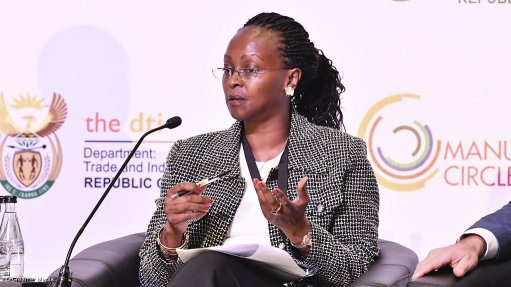
Kenyan Ambassador to South Africa Jean Kamau
Photo by: Creamer Media's Dylan Slater
The African Continental Free Trade Area (AfCFTA) plays a role in increasing intra-African trade, but Kenyan ambassador to South Africa Jean Kamau told delegates attending the Manufacturing Indaba, on Tuesday, that negotiations and collaboration between countries and the private sector were key to increasing trade.
She explained that the day-to-day issues facing the private sector would not be mitigated if these challenges were not addressed through negotiations.
Some of these challenges, she added, include nontrade barriers such as corruption, a lack of or failing infrastructure, and even border security concerns.
“If [Africa] can get negotiations right, this will spur on economic development, grow the private sector and deliver the required results [to move Africa forward],” she said.
Referring to the AfCFTA, she said that while this agreement had been a “natural progression”, the historical view was that it would not yield any results. She disagreed with this view, but said that for the agreement to deliver the expected results for Africa, the continent would need to use bilateral negotiations and regional trade agreements to their advantage.
According to Sundry Foods’ Ebele Enunwa, the AfCFTA agreement gave African countries the opportunity to review how best to use the opportunities they were provided, for the economic benefit of those countries.
In this respect, Intsimbi Future Production Technologies’ Tapiwa Samanga said African countries were currently “not meeting on a strategic level” and that, although the agreement was currently in play, the structure only encompassed 52 of the 55 African Union countries.
“There is no connectivity [and] no collaboration elements [to] be picked up between one country and the next,” he lamented.
“There is no dialogue between [private sector] companies in African countries. In the end, when member States negotiate, the industry, and private sector, is being left behind.”
From a South African perspective, however, Samanga said the country “had to be mindful of the building blocks that are regional economic communities” and that, in order for industries – such as manufacturing – to be successful, South Africa would need to “develop deep linkages with its neighbouring countries and link up with the rest of the continent”.
He explained that, in doing so, Africa needed to “change its level of ambition on the subject of manufacturing, and identify exactly what this means for the countries, and where the countries want to be positioned in the manufacturing chain.
Key to making this happen would be building the capacity for Africans to become players in the global manufacturing industry, Samanga added. “We have been recipients of products instead of manufacturing them and this is because we have been constrained in terms of our participation,” he elaborated.
“The simple thing that I think we need to do is to focus on talent and innovation in Africa – let’s unleash and equip our people to be able to contribute and to be able to make a significant contribution in terms of manufacturing globally, starting with Africa.”
Meanwhile, Volkswagen South Africa’s Thomas Schaefer stated that South Africa “needs to understand that it is symbiotically linked to Africa’s future”. He noted that, with particular reference to the automotive manufacturing industry, challenges include used car dumping, fuel quality, government policy, the cost of logistics and missing infrastructure.
However, these, and the continent’s other trade-related challenges, could all be addressed with political will.
“With political will [in play], these challenges are solvable, but it will not happen overnight,” he said.